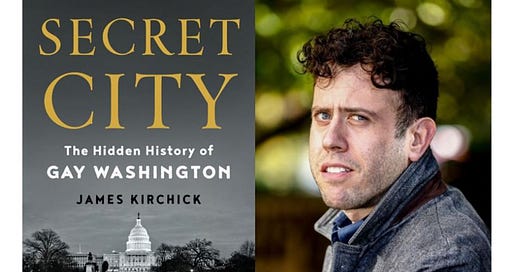Secret City
Lost talent, undeveloped insights, wasted relationships, neglected opportunities: such are the consequences of purges undertaken in pursuit of ideological purity, cultural conformity, or simply because the guy in charge wants to show who’s boss.
Slashing budgets in the name of efficiency and dressing it up in the language of “transformation” can have similar results, especially when undertaken in a heedless spirit of throw-the-bums-out.
We’re presently witnessing both types of upheaval– talent purges and budget cuts– in this administration’s effort to remake the US government. And in the decades ahead, we’ll feel the consequences of the brain drain that results.
A similar, but much less visible, brain drain reshaped national life in the 1950s-80s, as I learned last week while reading James Kirchick’s riveting Secret City: The Hidden History of Gay Washington. I bought the book on the recommendation of Stuart Stevens, a long-time Republican operative and speechwriter, most notably for John McCain and Mitt Romney, who has since left the party and now writes for Lincoln Square Media on Substack.
Stevens’ exposure to the impact of this brain drain began when he went to work for Jon Hinson, a young ex-Marine elected to represent Mississippi in the US House in 1978. Hinson was viewed as a fast-rising star in conservative Republican politics until his arrest a few years after taking office for having sex in a men’s room across from the Library of Congress. At the time, same-sex sex was a criminal offense, and the ensuing furor resulted in Hinson leaving Congress, getting a divorce, and being purged from his party. He later came out, and lived quietly with a male partner until he died of AIDS in 1995.
As Secret City documents, Hinson’s story was far from unusual. The book covers Washington between 1945 and 2000, from FDR’s final months through Bill Clinton’s last term. During those years, policies designed to variously suppress, punish, and humiliate gay people in an effort to limit their influence and keep them closeted were undertaken in response to political pressure, astro-turfed outrage, or simple paranoia.
Paranoia peaked during the Cold War years, when the red scare that sought to root out Communists who were assumed to be infiltrating the US government ran in tandem with a multi-decade and less well-known “lavender scare.” This scare was fueled by the belief that gays in government posed a security risk because they were vulnerable to blackmail. A cascade of investigations in Congress and law enforcement turned up precisely zero examples of blackmail, but the hysteria that drove this effort raged on regardless, and gays were banned from or driven out of thousands of federal jobs.
The massive loss of experience and talent that resulted had its greatest impact on the nation’s intelligence, diplomatic, and military services. For example, the most effective, nimble, and resourceful spies during World War II and in the following decades were disproportionately gay, perhaps because living a clandestine double life in a homophobic culture provided ideal preparation for a life in espionage.
Similarly, many superb gay diplomats who were able to leverage strong cross-national networks with gay envoys, emissaries, and counsels from around the world were hounded out of their jobs. No matter that they had built alliances and cultivated informants within hostile governments, or possessed stellar records of accomplishment, or had support at the highest levels of government. They were fired, or had their security clearances revoked, based on rumors, gossip, threats, denunciations, or sting operations.
In Secret City, Kirchick gives us insight into how the rollback of diversity we are now experiencing may unfold, and of the heedless waste of resources, human and material, such efforts inevitably spawn. Yet he also offers encouraging examples of how individuals can reclaim freedoms that have been denied them, and change history by doing so.
Frank Kameny is one example. A Harvard-trained astronomer charged with charting stars for the Army Map Service, he was suddenly recalled from Hawaii where he was leading a team tracking the Soviet launch of Sputnik 1. The Civil Service had received a “tip” about him and demanded his immediate presence at a meeting in DC, where he was asked if he were homosexual. Kameny refused to say and was immediately fired and prohibited from working in government, or in any organization that held federal contracts for the rest of his life.
But he found a local lawyer to represent him and filed suit. In doing, so he broke long-established precedent by insisting that the docket be filed in his name rather than anonymously. This was unprecedented in 1957, when gays taking any kind of public action sought to conceal or disguise their identities because the risks of being outed were so high. Kamany knew that he could be identified and targeted by both the police and the press by putting his name on the docket. But he wanted to give a human face to what would, in time, become a movement.
Kameny lost his case. He eventually appealed all the way to the Supreme Court, where he again lost. But his leaving the closet- the secret city- emboldened others, whose contributions to their country, communities, and workplaces have reaped incalculable benefits for all of us. We would do well now to remember and emulate his courage.
Like what you’re reading? Click here to order my most recent book Rising Together, or How Women Rise. Both are available from Amazon or your favorite bookseller.





